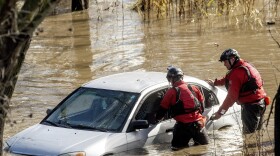
Nathan Rott
Nathan Rott is a correspondent on NPR's National Desk, where he focuses on environment issues and the American West.
Based at NPR West in Culver City, California, Rott spends a lot of his time on the road, covering everything from breaking news stories like California's wildfires to in-depth issues like the management of endangered species and many points between.
Rott owes his start at NPR to two extraordinary young men he never met. As the first recipient of the Stone and Holt Weeks Fellowship in 2010, he aims to honor the memory of the two brothers by carrying on their legacy of making the world a better place.
A graduate of the University of Montana, Rott prefers to be outside at just about every hour of the day. Prior to working at NPR, he worked a variety of jobs including wildland firefighting, commercial fishing, children's theater teaching, and professional snow-shoveling for the United States Antarctic Program. Odds are, he's shoveled more snow than you.
-
The monarch butterfly is widely recognized and widely dispersed across North America and it's in trouble. Federal officials decide soon whether it gets protection under the Endangered Species Act.
-
The United Nations effort to achieve "harmony" with the natural world kicks off in Colombia this week. Recent reports show there's a lot of work to do to achieve that goal.
-
The small western North Carolina towns of Marshall and Hot Springs were wrecked by historic floods caused by Tropical Storm Helene's rainfall. Days later, residents are just starting the cleanup.
-
A 'golden age' of rat research may be here. What the often unwanted companions can teach us about usRat and human lives have long intersected, but there's relatively little research about them. Thanks to advances in genomics and paleoarcheology, a lot more study may be on the horizon.
-
As Western Montana's blue-ribbon trout waters warm due to climate change, anglers are increasingly wrestling with the ethics of their sport.
-
The Supreme Court's recent term illustrates the judiciary's outsized role in government's ability to address climate change. The coming election could shape the judicial landscape for decades to come.
-
When authorities find wildlife that are being illegally trafficked, at ports or airports, the animals are often in terrible shape. Sick, starved, distressed. A pilot project in Southern California aims to get seized wildlife immediate care.
-
More than half of the Colorado River's water is used to grow crops, primarily livestock feed, a new study finds. The river and its users are facing tough decisions as the climate warms.
-
In a landmark U.N. study, researchers found nearly half of the world's threatened migratory species have declining populations. More than a fifth of the assessed animals face extinction.
-
Forecasters now say 8 to 15 inches of rain could fall in the mountains and foothills of Southern California.










